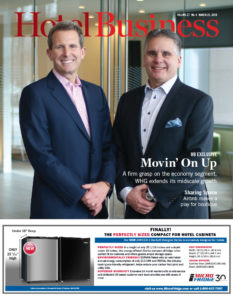 Despite President Donald Trump signing the recent tax reform bill into law, there’s still much more work to be done in Washington, especially with regard to hospitality. Familiar with the inner workings of government and politics, Asian American Hotel Owners Association (AAHOA) President and CEO Chip Rogers is highly optimistic regarding the direction the current administration is taking the industry, and this, of course, has a lot to do with the commander in chief’s background.
Despite President Donald Trump signing the recent tax reform bill into law, there’s still much more work to be done in Washington, especially with regard to hospitality. Familiar with the inner workings of government and politics, Asian American Hotel Owners Association (AAHOA) President and CEO Chip Rogers is highly optimistic regarding the direction the current administration is taking the industry, and this, of course, has a lot to do with the commander in chief’s background.
“Having a hotelier in the White House means that our industry has an advocate with an innate familiarity with our industry and its needs,” Rogers said.
AAHOA’s top executive spoke with Hotel Business about the biggest public relations blunders that hotels are making today; the upcoming midterm elections in Congress; and how industry associations can work together to move the hotel industry as a whole forward.
 If you had to pick one, what’s the number one outstanding issue in hospitality and lodging today? With unemployment at 4.1%, its lowest rate since 2000, one of the significant issues facing hoteliers is access to a consistent workforce. In an AAHOA membership survey last year, 86.6% of respondents reported current job vacancies at their hotels and 66.1% said they planned to expand their workforce in the next three years. Recruiting, hiring and retaining good employees proves challenging for employers when unemployment is low.
If you had to pick one, what’s the number one outstanding issue in hospitality and lodging today? With unemployment at 4.1%, its lowest rate since 2000, one of the significant issues facing hoteliers is access to a consistent workforce. In an AAHOA membership survey last year, 86.6% of respondents reported current job vacancies at their hotels and 66.1% said they planned to expand their workforce in the next three years. Recruiting, hiring and retaining good employees proves challenging for employers when unemployment is low.
What are some of the top challenges hotel owners are facing? Hoteliers face challenges on a few fronts, from predatory lawsuits and combating human trafficking to fighting arbitrary occupancy taxes and an uneven playing field littered with unregulated short-term rentals. We are making progress as an industry in overcoming these obstacles.
The House recently passed the ADA Education and Reform Act, which seeks to stop predatory drive-by lawsuits. Several states passed laws to prevent predatory lawyers and serial plaintiffs from targeting small businesses with frivolous lawsuits, but we still need to get a notice and cure period on the books to prevent these same lawsuits in federal court.
In the fight against human trafficking, AAHOA partnered with the DHS Blue Campaign, Polaris and Businesses Ending Slavery and Trafficking (BEST) to provide our members with training and education materials, webinars and certification to help their employees identify the signs of human trafficking and know what appropriate actions to take. Our industry is playing a significant role in promoting awareness and prevention of this crime, and our members are leading the way.
AAHOA’s advocacy efforts are also leading the fight against arbitrary occupancy tax increases in municipalities, and we’re working with our members and state legislators to create a more level playing field as unregulated short-term rentals increase in number.
How would you grade the current administration on its willingness to work with the hospitality industry on key issues? I give high marks to the administration for their willingness to work with the hospitality industry on many issues. Whether it’s combating human trafficking, prioritizing small businesses in the recent Tax Cuts and Jobs Act or eliminating unnecessary and burdensome regulations, we have a partner who fundamentally gets what our industry is about and what it needs to thrive. Mostly, we have found the administration is interested in hearing AAHOA’s story. From cabinet officials to staff, offices across the executive look to the lodging industry as a source for public policy.
How has AAHOA evolved over the years? AAHOA continues to evolve into an organization that speaks for all hotel owners. We’ve seen significant growth as more hoteliers realize AAHOA’s value. From networking and education to collective advocacy, we’re surpassing our membership goals and currently have almost 18,000 members who own about one in two hotels across the United States. Cultivating a reputation for effectiveness and promoting the benefits of AAHOA membership go a long way to our growth and success as an association.
You’re president and CEO of the largest hotel owners association in the country; you travel a lot; and you and your wife, Amy, have four children. How do you find your sweet spot for work/life balance? Finding a work/life balance is all about managing your time and your priorities. Knowing your priorities in life helps you manage your time. I work hard to never say that “I didn’t have time” for something, such as time with my family, because that is simply an excuse for not having your priorities in order. Family is most important to me. From coaching basketball, to watching cross country meets, or rebuilding classic cars with my son, making time for these activities helps ensure that my life is balanced.
Your background is in communications. What’s the biggest public relations blunder hotel owners are making today? The biggest public relations error hotel owners can make today is to be absent a voice in the marketplace of ideas. Hoteliers need to be vocal about their needs as an industry, as small business owners, and as job creators. Marketing is one thing that drives business, but if hoteliers are silent about where they stand on public policy and the steps their businesses take to improve the lives of their employees and guests, government will step in to fill the void, usually with unnecessary regulations, taxes and laws, and that hurts the bottom line. Allowing others to define our industry and role in the community leads to bad policy. I encourage all hoteliers, whether they’re AAHOA members or future members, to tell their political leaders what is good for business and what they’re doing to give back to the community.
What do you miss most about politics? How have you used your experience as an elected official in your current role? I got into politics because I had very specific ideas about how I could make life better for my community and my state. Having served in both chambers of the Georgia State House, I was able to promote and enact meaningful policies that helped bring about positive change in Georgia. Although I am no longer in office, I remain committed to serving my community. In my current role, I use the knowledge I gained as an elected official to shape our approach to advocacy. Success in politics, much like business, is about relationships. Knowing who to talk to and engage with on issues is vital to the success of advocacy efforts. I continue to promote ideas and public policy that help advance job creation, independent business, and the free market ideals that make our nation exceptional. However, I am often asked whether I miss public office. I can say, emphatically, no. It was a meaningful experience, but I am very happy to work with almost 18,000 entrepreneurs instead.
Midterms are around the corner. What’s your take on the upcoming elections? Will the majority shift at all? What will be the top issues this coming election cycle? Midterm elections are typically a referendum on the president with Congress serving as a proxy. The majorities in the House and Senate accomplished a lot with tax reform and need to really sell the benefits to their constituencies. People are keeping more of their hard-earned money. After years of stagnation, wages are on the rise again. The stock market is booming. Gas is under $2.80 a gallon. But people vote based on their perceptions of where they stand. If the average voter doesn’t feel like the economy is working for them, they may adopt a “throw the bums out” mindset. The success or failure of incumbents rests upon their ability to sell their successes and empathize with their constituents’ needs. If the Republicans can do this, they will hold their majorities.
We are several months away from November, so I am hesitant to speculate on what the top issue will be, although if history is an indicator, the Republicans can expect to lose seats, and the president’s job performance will loom large. Many House Republicans are retiring, but the polling numbers are shifting wildly. The map for a Democratic takeover of the Senate is challenging, so at this point, the stars do not seem to be aligning for either party to win a majority in both chambers.
How can industry associations work together to move the industry as a whole forward? Coalitions succeed when their shared objectives are clear and the strategic approach to achieving them is open and consensus-based. In working with association partners on issues such as ADA reform, preventing human trafficking, or joint-employer, being open about objectives and the degree to which one will engage on the issue, be it through advocacy, mobilizing members, funding, or public relations, is key. In many policy areas, we have an important and good working relationship with the American Hotel & Lodging Association (AHLA). Our joint annual Legislative Action Summit brings industry and hotel owners together to advocate for our agenda before Congress, and we have a strong relationship with Katherine Lugar [president/CEO], Mark Carrier [AHLA board chair] and Geoff Ballotti [AHLA board vice chair].
What has been the biggest challenge for you as president and CEO of AAHOA? Coming into the role as president and CEO, I knew AAHOA needed to make significant changes in terms of organization and our approach to advocacy and member outreach if we wanted to grow and become the recognized voice of hotel owners. Navigating institutional politics and history is necessary when one steps into a leadership role in any organization, and AAHOA was no different. I greatly value the open communication of ideas. Letting members know where I thought we could be as an association and how we would get there allowed us to set our priorities and strategies and move forward. I am proud of our accomplishments so far, and optimistic about what we will achieve in the future.

